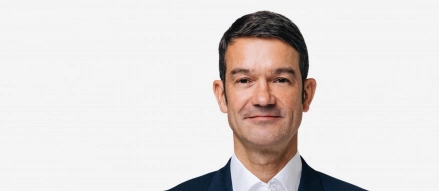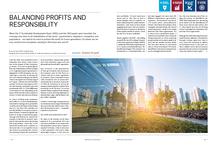
Using the SDGs to Add Value to Business
Since the SDGs were launched in 2015, companies have taken a more serious look at the impacts of their businesses on society. If we look at global figures from the United Nations Global Compact, 6,839 companies are now reporting on activities to advance decent work and economic growth (SDG 8), which is the highest level of reporting of all 17 goals. Whereas less than half that number (3,234) are reporting on activities that advance sustainable cities and communities (SDG 11). While differences will continue to exist, depending on the nature of the business and its impact on society, it is clear that more can be done.
Partnerships for the Goals
Mazars is proud to be the gold sponsor of the 2018 Global Goals Yearbook - a publication in support of the SDGs and the advancement of corporate sustainability globally. Promoting comprehensive knowledge-exchange and learning in the spirit of the SDGs and the Ten Principles of the UN Global Compact, our Sustainability Leaders touch on four areas of best practice in relation to the SDGs:
Can profit and responsibility mix?
For many in the business world, there appears to be a conundrum: How can it be more profitable to act responsibly and potentially accept more expensive supplies? At Mazars, what we have seen is that companies which have made meaningful progress in this area are more profitable. We have heard comments such as “Now that we have a proper dialogue with our suppliers, we better understand their needs and their limitations,” and “Since we have started engaging much more with our suppliers, there has been an increase in the quality of the supplies and fewer returns, which has led us to be more profitable.”
Mazars, together with Shift – the leading nonprofit for the UN Guiding Principles on Business and Human Rights (UNGPs) – created the UNGP Reporting Framework. This initiative was introduced as a multistakeholder project that engaged with more than 200 different organizations: governments, regulators, multinational businesses, civil society actors, and professional advisers. From those conversations, there emerged a consistent theme: the value of respecting people’s needs to be embedded across the whole organization. If it is seen as only a compliance matter, it remains a cost and little value is achieved.
At Mazars we are convinced that acting responsibly as well as respecting people and the environment needs to be built into the broader business model. The costs then become an investment and, as with all investments, KPIs can be identified so that policies and processes can be managed and controlled. Now the issue becomes one of how to begin the process. As identified in the UNGP Reporting Framework, the starting point needs to be the identification of those issues that are most salient, that is, where people have the risk of being severely and negatively impacted by the activities of an organization.
The impact of regulation
Regulation could have a greater role to play. Regulators could expressly demand that companies not only set out the results of sustainable actions, but also how they are doing it. Given that, on average, 80 percent of the market value of public companies resides in intangibles and is not audited – as is the case with the financial part of the annual report – this non-financial information could be independently audited. This would provide greater confidence in the credibility of what is being disclosed.
In terms of the overall effect of regulation, we have seen companies start to take greater ownership of the subject. As a result, more companies are beginning to understand what they do not know and are looking for support from firms such as Mazars to help them address and embed their CSR strategies.
This may include issues such as the identification of actual and potential material impacts on people and the environment; how risk areas have been identified; and whether they are being assessed and monitored. We have observed that CSR has moved from a purely compliance exercise to companies looking to derive greater value through the measurement of performance indicators and indexes.
While the debate continues on whether the regulatory or voluntary approach is better, the reality is that they are mutually reinforcing. For example, in a country where regulations are mainly followed on a voluntary basis, we see that companies which do not initially participate eventually do because of reputational perceptions.
Using SDGs to add value
Companies are slowly but surely beginning to report on the SDGs that represent the risks most salient to their business activities. At Mazars, we have been playing our part by helping companies create greater value for all by being more sustainable – be that educating global boards, identifying the risks on which to focus, implementing new processes, or providing assurance on non-financial reporting.
With increased levels of regulation and consumer awareness – and with the SDGs and a plethora of voluntary guidance – there is only one direction in which to travel. The sooner a business starts to address its sustainability footprint by building it into the culture of the organization, the greater its chances of longer-term profitability, together with the knowledge that it is playing its proper part within society.


